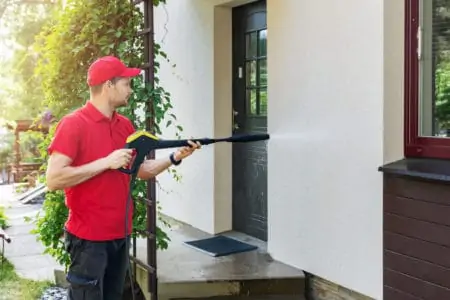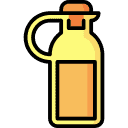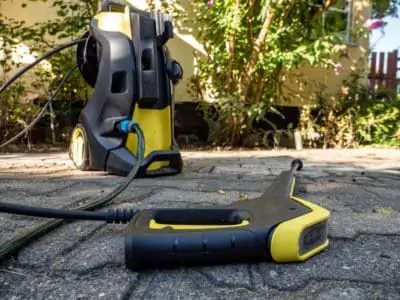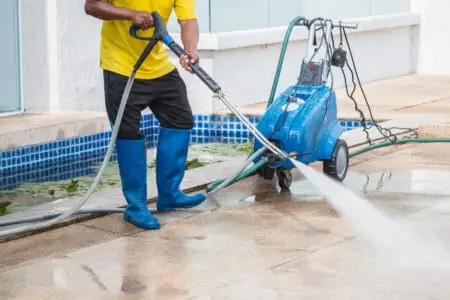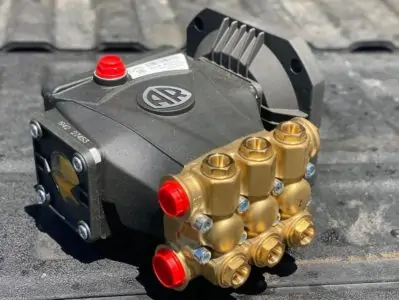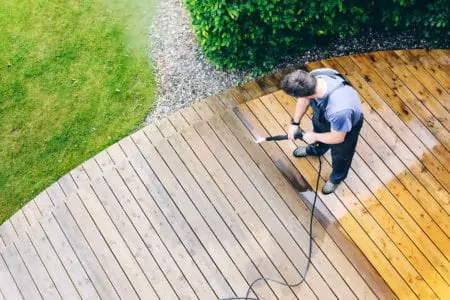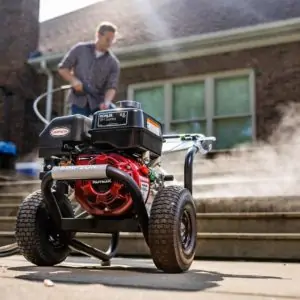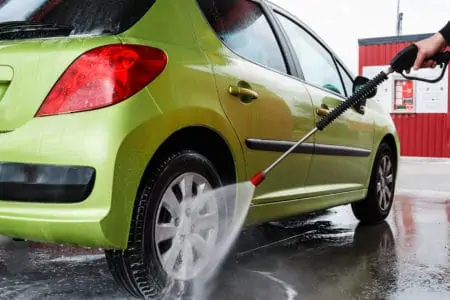You may think that power washing and pressure washing are the same thing. After all, the phrases are used interchangeably — even in marketing! So it can be quite confusing.
But we’ll break down the big differences between power washing vs pressure washing. We’ll also discuss the pros and cons of each, so you know which is the best avenue for you to take for your cleaning tasks.
Key Takeaways
- Power washing uses hot water, making it ideal for heavy-duty jobs and heavily-soiled messes, mostly in commercial settings.
- Pressure washing is suitable for residential use, like cleaning siding, patios, decks, cars, driveways, and garages.
- The main difference between power washing and pressure washing is the use of heated water in power washing machines.
- Both power and pressure washers have pros and cons, so choose the one that best suits your specific cleaning needs.
Is There a Difference Between Power Washing and Pressure Washing?
Yes — although at first glance, you may not think so. And many people still use the terms interchangeably.
The main difference is that power washing machines use heated water, while pressure washers don’t.
The heat helps to clean tough dirt such as grime, mildew, salt, and grease much easier. It also allows you to limit your use of pressure washer detergent, as it’s not as necessary. Power washing is preferred for heavily soiled surfaces that can handle heated water, specifically concrete or cement.
Power Washing vs Pressure Washing
So if you’re deciding between a power washer and a pressure washer, it helps to know the pros and cons of each. We’ll walk you through the main ones so you know what to expect.
Power Washing
Let’s look at the big advantages of choosing a power washer.
- Heat helps with dirt: As mentioned, the heat helps to clean heavily soiled areas and tough messes. This is especially good with grease, grime, mold, and mildew. The heat can more easily break these particles apart and wash them away, often without the need for detergent.
- High pressure: Power washers typically have a higher pressure than pressure washers. They’re usually between 2000 and 4000 PSI, with a much higher GPM. Pressure washers can be anywhere between 500 and 4000 PSI, so you know when you choose a power washer, there’s a higher chance it will have higher pressure.
- Weeds and moss: A power washer is great at killing weeds and moss. The heat stops them in their tracks and limits regrowth. So if you have weeds and moss ruining the aesthetic of your walkway, a power washer is a good shout.
- Good for big jobs: For big jobs, and commercial cleaning, a power washer is a top option for many people. You can finish jobs quicker, allowing you to do more in a day, and make more money! Plus, it takes the stress and elbow grease out of some heavy tasks.
Something To Note
What about some of the reasons you may not want to consider a power washer? Let’s look at the main disadvantages.
- It can damage surfaces: Due to the heat, power washers can damage surfaces. Power washing is best for concrete or cement since these can better handle high heat. Test in an inconspicuous area or do some research before trying it on certain surfaces.
- The cost: One of the big drawbacks of power washers is the cost. The heating elements make these devices very expensive. You’re looking at being thousands of dollars down due to these appliances.
- Not as versatile: Because of the heat and the super high pressure, these are not as versatile as pressure washers. They’re more aimed at specific jobs, whereas pressure washers can often be used for a huge variety of tasks.
Pressure Washing
Now, let’s look at all the pros of pressure washers. These popular tools are loved by many, so there are a lot of great advantages to look at!
- There’s something for everyone: Pressure washers come in a range of PSI numbers and GPM numbers. So there’s something for everyone on the market. Whether you’re looking to pressure wash cars, siding, bikes, or something else — you’ll find a pressure washer that works for you.
- Lots of options: There are many different types of pressure washers. The two main categories are gas and electric. Gas is typically a lot stronger, whereas electric pressure washers are great for domestic use. Breaking that down even further, in the electric category, you’ll even find cordless pressure washers if you want something you can easily transport.
- They come in a range of prices: If you’re looking at pressure washers, and are on a specific budget, you’re in luck. Pressure washers come in at a range of prices, so there’s something for most people’s budgets.
- Versatile uses: Pressure washers, depending on the PSI, can clean basically any surface without damage. You can use one tool to clean everything surrounding your residential property, including your cars! They come with different types of nozzles, too, to make your pressure washer safe for specific jobs.
- Easy to use: Pressure washers are user-friendly. While they may require a bit of a learning curve, they’re not difficult to use. You can usually get yours up and running within a few minutes of it arriving!
Before you get sold on a pressure washer, let’s talk you through some of the main disadvantages.
- They can still cause damage: Pressure washers can still go up to 4000, specifically gas pressure washers. Therefore, the high PSI can still cause damage to some specific surfaces. You need to be really careful with house siding, decking, and cars.
- Danger to yourself: Pressure washers can also be a danger to yourself, your family, and your pets. They can cause injuries when not used properly, especially when using a high PSI and a 0-degree nozzle.
- Cordless pressure washers: Cordless pressure washers sound like a total dream, don’t they? However, they are usually a lot less forceful with the PSI usually being below 1000. This doesn’t allow for deep cleaning of surfaces.
Power vs Pressure Washing: Which One Is Best for You?
The right tool for you depends entirely on what you need the tool for.
Power washers are recommended for heavy-duty or commercial jobs, especially where there will be a lot of grease, grime, mold, or mildew. The high heat can deep clean and get surfaces cleared very quickly. This saves you time and money if you’re doing this as a business.
However, power washers are not necessarily suited for residential properties. So we don’t recommend them for home use.
Pressure washers are the best option if you want to use something around the house. They come in a range of PSI numbers, so you’ll be able to find something that suits your surfaces.
Pressure washers are also a lot more affordable. You can use them for cleaning driveways, garages, cars, siding, decking, patios, and many other surfaces.
Tips for Power or Pressure Washing Safely
With any power tool comes some risks. So we’ll talk you through our top safety tips so you can get to using your power or pressure washer with total caution.
- Read the user manual: We know, not the most exciting read. But the user manual for specific models will give you the most valuable information about your specific pressure washer so you are prepared to use it most effectively and safely.
- Know which nozzle is best: Your pressure or power washer is likely to come with a few different nozzles. You need to read up on which is best for specific jobs. Our main warning is about the zero-degree nozzle. It’s very rare that you’ll ever need to use this unless you have a very stubborn stain on concrete or cement. This is the most forceful nozzle and can be dangerous to use, whether you cause injury or end up damaging a surface.
- Dress the part: You should make sure to wear protective clothing. This includes tight sturdy clothing rather than baggy loose clothing. Wear gloves and glasses, if you can, to avoid any debris hurting your eyes or hands.
- Prepare the surrounding area: Make sure that the surrounding area is ready for your pressure or power washing. Cover anything fragile or electronic. This includes vents, and power sockets, as well as removing kids and pets from the area. You should also be sure to get rid of any tripping hazards.
- Don’t use ladders: You may be tempted to use ladders, especially when pressure washing the siding of your house. But never ever use ladders. The pressure from your washer combined with precariously standing on a high ladder can lead to serious injuries.
- When using electric models: Don’t use extension cords. This can cause the cord to be off the ground which risks electrocution. Plus it can shorten the life of your pressure washer.
- When using gas models: Always use it in an outdoor and well-ventilated space. The fumes that come off these models contain carbon monoxide, so you should never use them indoors.
- Before you uncouple: Before you uncouple hoses or add different pressure washer attachments, stop the machine. Turn the water off, release all water pressure from the system and then change the attachment.
- Utilize the safety lock: If yours comes with a safety lock on the trigger, use it. This will prevent accidental sprays when you step away from the machine. You should also use it when you’re changing nozzle tips.
- Winterize your pressure washer: When you’re not going to be using it for a few weeks in the cold months, winterize it. Otherwise, you may go to collect it and find that it’s totally useless now.
FAQs
Battle of the Pressure Washers
There’s no clear winner in this power washing vs pressure washing guide. That’s because each power tool is used for a different purpose.
Power washing has a heating element, making it the perfect tool for heavily-soiled messes and heavy-duty jobs. Many people use them for commercial jobs, such as cleaning parking lots of sidewalks.
Pressure washing, on the other hand, is perfect for residential use. These come in a range of PSI numbers, types, and styles. You’ll be able to use these for your siding, patio, deck, cars, driveways, garages, and much more.
